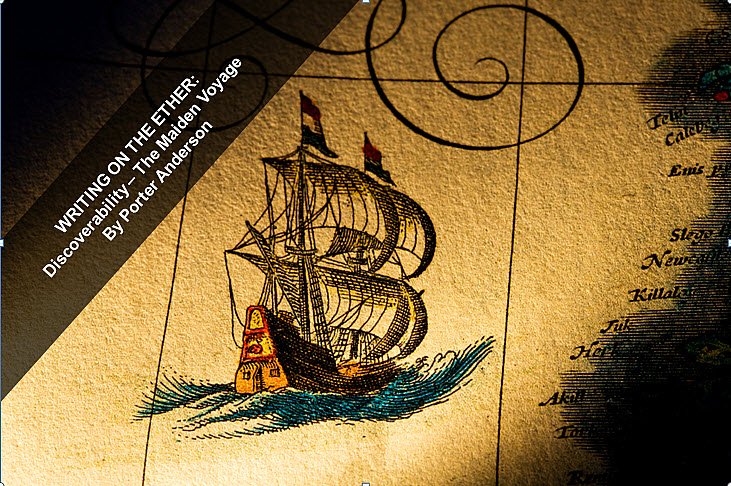
- DBW Discoverability: The Maiden Voyage
- eBook Pricing: Help Support Jo Rowling / Owen, Tait
- New Moves and Models: Rogue & Brightline / Shatzkin
- Libraries: Fingers Pointed / Gonzalez
- Penguin Sues Authors: Your Advance, Please
- Conferences: Friedman at LitFlow in Berlin, and more
- Books: Reading on the Ether
- Last Gas: Saltwater Nooks? / Reilly
?
Suppose you knew nothing about publishing today. (Blissful thought, isn?t it?)
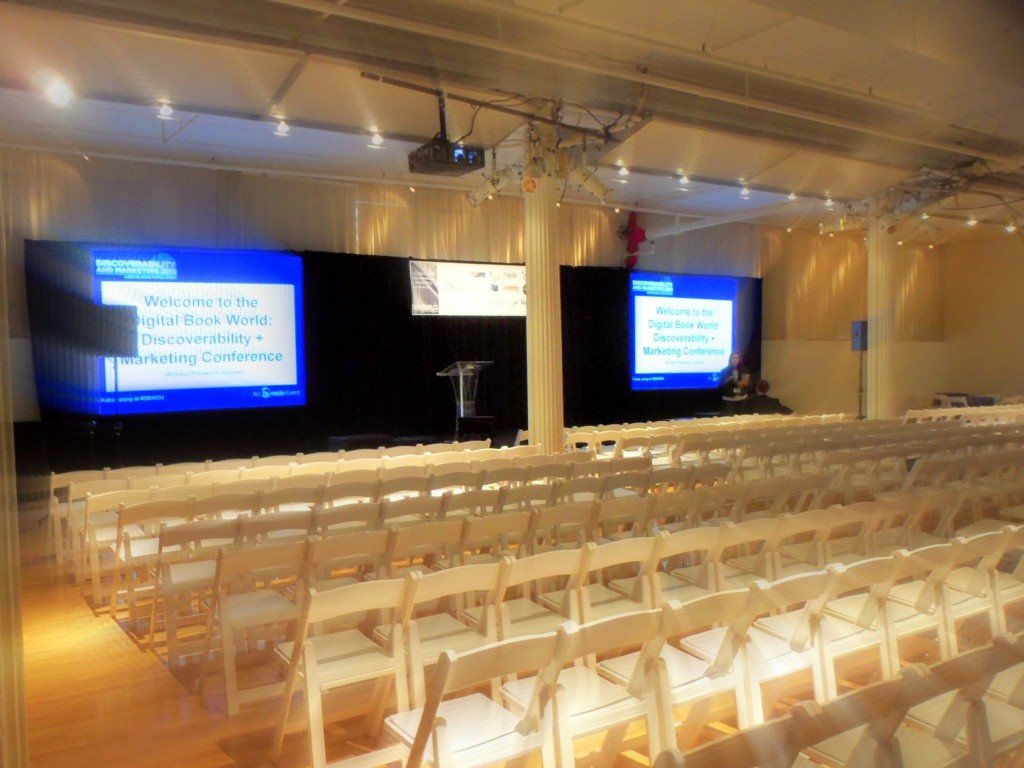 What if you walked into Digital Book World?s (DBW)? Discoverability and Marketing Conference this week, sat down in New York?s spacious Metropolitan Pavilion with its gleaming-shipboard floors, and spent two days with us?
What if you walked into Digital Book World?s (DBW)? Discoverability and Marketing Conference this week, sat down in New York?s spacious Metropolitan Pavilion with its gleaming-shipboard floors, and spent two days with us?
Hashtagging #DBWDM with the best of us on deck.
 You might have come away from Monday and Tuesday?s conference with an admiration for our industry professionals? capacity to withstand?confusion.
You might have come away from Monday and Tuesday?s conference with an admiration for our industry professionals? capacity to withstand?confusion.
You might even think we enjoy it; eagerly checking our box lunches to see if any good confusion is in there, scarfing it down with the pasta salad, asking for more.
Because that?s what we discovered at Discoverability ? we discovered there?s a lot of confusion about how to get there from here.
Febreeze and Angry Birds will help us understand how books are sold @? #DBWDM
Rich Fahle
You know Rich Fahle of Bibliostar.tv and Astral Road Media, right? He?s a videographer and works in author marketing. He regularly tapes on-site conference conversations for Digital Book World.
In a DBW Expert Blog Post, Discoverability Tools and the Writer?s ?Fight for Time,? Fahle has this? observation about the confab:
This, finally, is the important next phase of the digital transition?the industry is ready to address discoverability with its full attention? Those focused discussions?(are) possibly the best news to come out of the conference.
Fahle?s concern in his post is on writers. But the whole community of publishing is at sea until it can sort out the pivotal problem of how you make a book discoverable when, as Laura Dawson tells us, there are 32 million active titles in Books in Print.
I?m going to propose here that the Discoverability and Marketing Conference didn?t quite get it ? or didn?t always get it, let me put it that way. As Fahle writes, the best thing is that it happened at all. And plenty of good experiences in the conference?s debut will mean an even better gathering the next time.
Perils of Twitter: I took a mid-afternoon nap, and dreamed I was at #DBWDM. Woke up very confused? I blame @.?
Don?t get me wrong.
- I?m not saying that this wasn?t a valuable conference. It was.
- I?m not saying it was badly put-together. It was not.
- And I?m certainly not saying it was presented by anything but great folks with a good idea and a lot of talent and hard, long work ? if anything, I was lucky to be part of the team, as I live-tweeted and wrote about the confab.

Kate Rados
No, what I?m saying is that host Kate Rados, DBW Community Manager Gary Lynch, DBW Editorial Director Jeremy Greenfield, and their many colleagues created a conference the very makeup of which reflected the confusion with which a transition-traumatized industry is facing this problem.

Rick Joyce
After all, that?s what Perseus? Rick Joyce told us in his fine opening keynote on Monday:
If you came here looking for a map, good luck.
Your GPS is useless this time. To follow these trade routes, we have to find them first. And in that regard, the exhilarating opening block of presentations in the conference on Monday ? as I wrote in my Day One wrap for the DBW Expert Blogs ? was right on the money.
Joyce?s curtain-raiser, ?The Next Wave of Discoverability,? was themed on Old World exploration and it included these gems, which I?m drawing from my tweeterie:
- Context Optimizers, ?tools yet to be invented.? We must enhance metadata with new categories, reinvent browsing.
- We need to ??Understand the Natives??what seems to motivate anybody?..connect, collect, compete, accrue, assist??
- Needing ?new instruments,? Joyce says we?re trying to find ?assets that are built to travel (as) behavioral enablers.?
- Assets that travel include ?links with headlines, images, personalization, humor, inspiration?authenticity.?
- The final New Territory is Big Data: ?At any given moment 1% to 2% of all pages on #book-retailer sites are down.?
For its eloquence and point of view, Joyce?s presentation was never topped during the conference?s two days. In the easy glow of hindsight, I can say now that I?d love to have seen Joyce return with a final, shorter observation on what we?d seen and heard in the two days. This excellent opener deserved a benediction.
?
And there were more strong entries from other folks to follow, high points throughout the two days. By midday Monday, however, hints at the confusion were starting to show in our own experience in the room. And by Tuesday, the conference was ? nobody?s fault, mind you? adrift in a slow current that felt almost as baffling as our over-arching theme.
Partly the effects of fatigue, of course, and partly the product of a low-energy presentation or two, things felt more scattered than conclusive as we finished up.
The last sessions seemed to be ?all over the place,? one attendee put it. Nothing fell apart, by a long shot. But it was as if we lost our breeze and the good ship DBWDM was idled in the calm.
Sharing the #DBWDM love-glow with the team: We?re crashing ways to incorporate more images/video content into our work.?
Do you know the nautical term ?tacking?? Not tacky. Tacking is zigzagging, a pattern a sailor might use to take advantage of a wind, changing direction with the helm alee.
This conference did a lot of tacking in its two days. That?s not necessarily bad. It just requires your crew to know where they?re going with each shift.

Kelly Gallgher
We veered mainly between brightly informative conceptual overviews to course-like instructional sessions. Not a thing wrong with either. It was the juxtaposition that was a little hard to read.
There were the bracing data arrays of Bowker?s Kelly Gallagher (whom we?ve just learned is headed for Ingram ? congratulations, Kelly) and Google?s Gavin Bishop. And then there was a? presenter telling us what happens when you start a tweet with an ?@-symbol? handle. If you don?t know about that use of the ?@-symbol? ? it?s the ?reply? protocol ? that?s OK, don?t feel bad. But in a Manhattan conference of professionals in publishing and/or marketing, that?s an awfully basic fillip of one social media platform.
Rados ran a nice, tight ship, agreeably moving things along precisely on time. And the parade of presentations went off with precious few technical glitches, also no mean feat.
And fanned by the efficiency with which Joyce sustained his keynote metaphor ? our need to brave terra incognita and search for new answers ? we had two very valid, major winds of trade, if you please, cross-cutting the conference:
- Theoretical and/or conceptual issues of publishing?s response to a content-drowned market; and
- Technical approaches to online procedures in modern marketing.
Even within the second group, the more technical presentations, we tended to veer from the open water of sophisticated schooners to the paper-boat shallows ? from glimpses of the scope of what?s out there to handy-but-basic material.
Come, shall we tack?
huge congrats to @ on joining Ingram!?

Marshall D. Simmonds
Schooner: This is a keenly domesticated geek, the Greystoke of ?Authorship and SEO.? Marshall Simmonds told us not to ignore Google+ because the wider Google-verse is integrating so many of its assets there. Our social graphs sailed when he quoted Othar Hansson: ?We know that great content comes from great authors.??

Jessica Best
Paper Boat: She is a vivacious and well-dressed presenter. And Jessica Best?s ?Back to Basics: Email Marketing Still Works!? made the most of that exclamation point: ?Your email should be permission based,? she said, and she?s completely right. But somehow we?d tacked over to workshop mode ? from principle and precept to the special needs of mobile emails: look out for the ?fat thumb? of the recipient.

Dan Lubart
Schooner: Dan Lubart and Angela Tribelli of HarperCollins make ?team teaching? interesting again. They brought a competent, shared delivery to? ?Marketing Analytics: You Can?t Grow What You Can?t Measure.?

Angela Tribelli
Among the best messages delivered in this survey of philosophy:
- ?Dig Deep ? or why creatives need to sit with quants,? and
- Prepare to be surprised,? because If you go into analytics with bias, you?ll see only what you want.

Clinton Kabler
Paper Boat among the Schooners: Clinton Kabler of BookRiot has the drop on Neil Gaiman and Margaret Atwood. There?s nothing here at the Ether but highest regard for His Sandmanfulness and for The Great Lady Who Tweets, I love both writers. But, dude, Kabler showed us how neither of Gaiman nor Atwood has a ?buy? button on her or his home pages. Get out, right? But it?s true. I clicked over and looked.
From my tweeterie: ?What do you anticipate achieving with this landing page??You?ve got about two seconds of their attention.? And he?s right.
Kabler was an instant hybrid in our little regatta here. He came in with some schooner-class observations, but operated (in the conference?s setting) in the workshop/paper-boats mode, starting with that overlong title for his presentation, a bit of titular verbosity shared by many presenters in this show: ?Creating Landing Pages That Don?t Suck: Converting Click-Throughs to Buyers.?
Note for future confab presenters everywhere: Your title need not be a Kindle Single.
Let me show you how close Kabler came to getting us into deeper waters of healthy debate in ethics, efficacy, or both:
What bundling (ebook + print book) does is?destroy the correlation users have between value and price.
That statement involves the ?default bias? with which marketers can drive consumers to choose the ?best value? option among prices. ?Destroying the correlation users have between value and price,? for some, is a pretty questionable pastime. Presented as a commercial coup, it might leave a bit of guilt gnawing at your conscience.

Fauzia Burke
It was FSB Associates? president Fauzia Burke who, at lunch Monday, was the first I heard to renounce such marketing modes as something some of us feel is incorrect and/or at the least unnecessary. We?d glimpsed a grand, worthy debate there, thanks to Kabler, standing as we do on the edge of a flat world suddenly gone round in marketing.
But instead of entering a conference forum that could test such? considerations of what?s right and what isn?t (and who says so) , we were off again that afternoon, on a series of associated topics.
We?d missed the chance Kabler had held out to us to explore the white-sand beach that lies between Discoverability and Marketing.
But for Kabler?s part, even within the crass cartography of such salesboy technique, we must credit him for making something more of his session than it might have been. I like him for that.
Add a like button, post more photos, reply to every comment to quickly increase FB reach #DBWDM @?
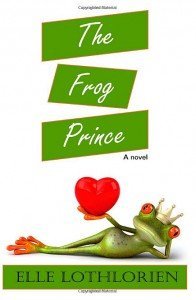 Paper Boats: In a purely praiseworthy effort to include authors in the program, the conference presented Elle Lothlorian and Erika Napoletano in the mix, and the organizers are to be commended for that.
Paper Boats: In a purely praiseworthy effort to include authors in the program, the conference presented Elle Lothlorian and Erika Napoletano in the mix, and the organizers are to be commended for that.
It turns out that these two writers? presentations turn on some very negative experiences.

Elle Lothlorian
Lothlorian has attracted condemnation from some for her practice of engaging with negative review-writers:
My goal is to make it right, treat the customer the way they should be treated when not liking the product.

Erika Napoletano
Napoletano pictures herself as a poster redhead for the publicity support she believes publishers don?t provide authors:
Authors believe their publishers are partners?
?only to find this may not be how a publisher sees it.
Both these handsomely ambitious, committed, publishing writers opened with somewhat rambling expressions of their displeasure at how they?ve been treated, either by critics of their reader relations or by publishers? publicity efforts (or lack thereof). And their complaints seem valid and understandable.
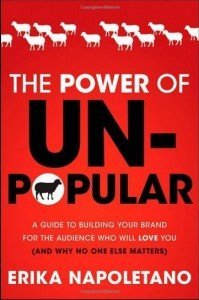 But ?look how badly I?ve been treated? doesn?t engender a lot of audience support in any setting, not just in a publishing arena.
But ?look how badly I?ve been treated? doesn?t engender a lot of audience support in any setting, not just in a publishing arena.
And while coarse language may seem a fun way to offer one?s fiery-redheadedness to an audience of peers gathered in a professional conference in New York, it actually doesn?t play that well out in the house.
Someone referred later to this as ?colorful.? I?ll go with that, too.
?
Schooners, quickly: Among more of the stronger high-view presentations at DBW?s Discoverability and Marketing, the standouts included:
- Gavin Bishop?s ?How Searchers Become Readers: Audience Insights from Google? (the lead on a coming white paper about search as a gateway to for consumer interest): Google?s study shows some 1.5 billion searches each year related to books.
-

Mike Grehan
Mike Grehan of ClickZ?s ?The Future of Digital Marketing? I?m told is a 45-minute presentation compressed into 30 minutes. That?s too bad because the breathless speed at which Grehan raced through it left a lot of it hard for the attentive crowd to catch, and this was good stuff, I?d love to have heard more. ?We move away from ?influentials,?? he said, ?and start to focus on small groups of connected friends.?
-

Jon Fine
Jon Fine?s fine presentation from Amazon, ?Secrets to More Effectively Marketing and Promoting Your Books on Amazon? contained only one real secret, it seems (or at least one bit of info few of us had heard) ? that Facebook elements will ?soon? be added to author pages. Sounds like yet another smart move among the industry?s largest apparatus of smart retailing moves. And I want to congratulate DBW on having both Fine and B&N?s Sasha Norkin on the program. In terms of presentational presence and informational value, there was no comparison who was the stronger, but the presence of both companies onboard gave us the conference its even keel. Good programming.
Fine is a thoroughgoing asset to his company. He presents without snark or hubris Seattle?s formidable assets, made available to some 40,000 publishers. He spoke of how authors are considered ?the other customer? because of their importance to the operation. Of everything heard in the conference, Fine?s statement may have been one of the most meaningful to the topic in terms of discoverability:
So, @ and I are starting a band called ?Milkshake in My Fanny Pack?For better or worse, Amazon has become the common ground for publishing.
?
One fine paper boat: Corey Hartford?s ?Marketing Results via Keyword Research? made the F+W home team look even better (as if it needed help).

Corey Hartford
Here, we were squarely in workshop/how-to mode, yes. But put aside the seeming friction between such sessions and more conceptual presentations, and what you have is a winningly devoted master of metadata.
He?s hardly the only presenter from DBWDM who could use some stage-presence coaching. In any field, the experts may not be the most natural front people. But in Hartford?s case, this was no problem because the guy?s sheer love of his keywords and how he makes them dance was a pleasure to see in action.

Richard Nash
Schooner, explained: Tucked into the second day?s afternoon was a chat led by Greenfield with GoodReads? Patrick Brown and Small Demons? Richard Nash. In that conversation, we got a succinct and useful delineation from Nash about Small Demons and what it?s meant to do.
While the point of GoodReads, of course, is to connect books with other books that readers may enjoy and want to share, Nash said the point of Small Demons is to connect books with other parts of our culture, to draw those lines of reference and revelation that enrich our understanding of a ?storyverse? (his phrase) that goes beyond our books and deep into our lives.
https://twitter.com/BublishMe/status/250294727763693568
?
And in wrapping this wrap, I want to point out to you the importance ? in our industry?s storyverse ? of the Discoverability and Marketing Conference?s newness. There are pitfalls in creating new events of this kind, as any producing organization can tell you.

Gary Lynch
I spoke in May for the Ether with DBW Community Manager Gary Lynch about his plans and concepts for this new vessel from F+W Media on our annual journey of major publishing conferences.
I liked his candor:
There?s always a risk when you launch a new event on a subject that?s still very much in the early stages of acceptance in the market. If you do it too soon and the market doesn?t think they need it, then the conference doesn?t work. If you wait too long, then competitors fill the void and your conference becomes a ?me too.? My sense is that our timing is spot-on.
Lynch?s sense for timing, clearly, is right.
And if the organization of the conference seemed to lurch at times between the ?tutorial?-style sessions he had envisioned in the spring and the 30,000-foot overview presentations that to me seem more useful at this point, I can?t help but feel that getting this critical component of the digital dynamic, discoverability, squarely onstage as DBW did was an important, worthy, and salutary exercise.

Joe Pulizzi
And some of the best insights moved fast, the program so rich that catching it all was tough.
Joe Pulizzi of Content Marketing Institute, for example, captured a lot of attention with his fly-by question about why publishers aren?t the ones platforming. He called the current model flawed ?? authors madly platforming, shouldering ever greater loads of PR and marketing burdens while writing less and less.
And he asked publishers, rhetorically:
Why don?t you get authors involved in YOUR platform?
https://twitter.com/DeidreKnight/status/250294254704930816
?
As part of his own conference coverage, DBW?s Greenfield wrote Book Discovery Landscape Becomes More Complicated as Reader Behavior Fractures, based on? Gallagher?s presentation from Bowker, ?Looking Beyond the Book.?
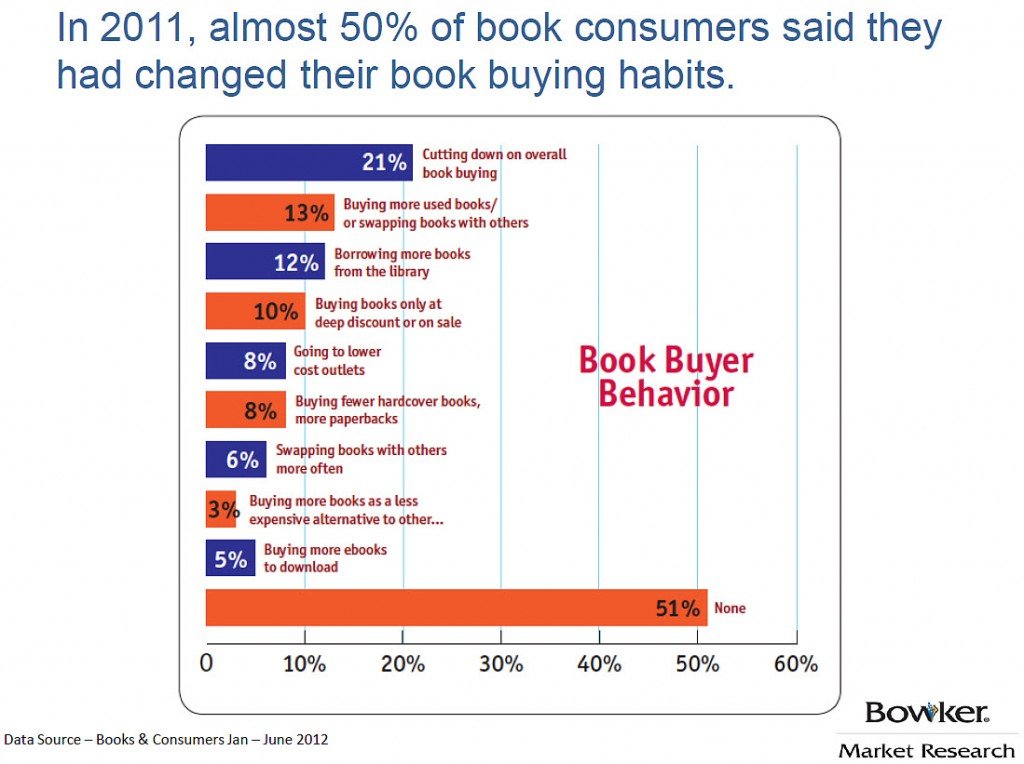
Bowker Market Research, from Kelly Gallagher?s DBWDM presentation
Gallagher deftly drove home for all of us just how complex this moment is in book discoverability today.
During his presentation, he was tweeted saying:
How do tablet owners discover books? We find that an excerpt becomes very important for tablet owners.
How do overall readers discover new ebooks? Again, the excerpt online is a key but also an author site, as well.
A female YA reader, 30-44, relies on social network tips, a teaser chapter in a print book, and online retailer recommendations.
And as Greenfiled writes it:
Tablet owners discover new books through free excerpts about 15% of the time; but readers of young adult fiction discover new books through the same way about 6% of the time. So marketers of young adult fiction have a lot to think about when they want to reach readers who read on tablets.
Jeremy Greenfield
Or try on this challenge for marketers, see how it suits you (this is Greenfield again):
A 27-year-old female romance reader from suburban Indianapolis who reads on a tablet computer but spends most of her time browsing the Web on her laptop versus a 43-year-old female romance reader living in Los Angeles who reads and buys exclusively on her e-reader. They?re both romance readers and female, but couldn?t be more different otherwise when it comes to how they discover and read books ? and reaching them takes different marketing tactics.
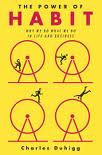 Then look at how blogger ?Ellen? at Word Thief writes up what struck her from Jon Fine?s presentation, in her post Digital Book World: Books vs. Everything Else, recalling his line:
Then look at how blogger ?Ellen? at Word Thief writes up what struck her from Jon Fine?s presentation, in her post Digital Book World: Books vs. Everything Else, recalling his line:
?It?s not about Print vs. Digital. It?s about Books vs. Everything Else.?
Ellen goes on to write:
I miss being at #DBWDM ? where people understood the jargon and didn?t just throw around buzzwords.So our real enemy is not the e-readers popping up in every direction. Our real enemy is every other activity that distracts people from reading nowadays: TV, movies, video games, Facebook, the internet, blogging (ha), etc. Later in the day, Charles Duhigg gave a talk on ?Using the Power of Habit to Market and Sell Books.? His thesis, briefly?
Angry Birds is your biggest competition.
?
As for my desire (this is just my opinion) for a more conceptual understanding of what we need and want in discoverability, over at Harvard Business Review, Irfan Kamal writes in Metrics Are Easy; Insight Is Hard:
It isn?t uncommon to see reports overflowing with data and benchmarks drawn from millions of underlying data points covering existing channels like display, email, website, search, and shopper/loyalty?In contrast to this abundant data, insights are relatively rare. Insights here are defined as actionable, data-driven findings that create business value.
That?s the seaworthy promise of DBW?s Discoverability and Marketing Conference in its next iteration.The promise, and the challenge.
No conference can be all things to all people, and the more brightly a line is drawn around what?s wanted in a given confab, the more assuredly it will draw its audience, its speakers, and its conclusions. In that world of abundance our friend Brian O?Leary loves to tell us about, I believe that the victory belongs to the selective, the discerning, and the focused.
DBWDM has had a fine start, something to be really proud of. I?m so glad I was there on the first outing.
And now, it?s time for it, too, to take to the higher seas. I think there?s a good chance that if some smart decisions are made and honored, this conference will, itself, be an admired schooner in our annual fleet of confabs.
?
If you?d like to look further into issues of discoverability and marketing in the industry! the industry! consider joining the free webcast on October 4 at 1pET / 10aPT / 1800BT for the Bowker Consumer Presentation on ?Beyond the Book ? Marketing in the Right Place at the Right Time,? presented by DBWDM.
Information and free registration at Free Webcast: How Social Networks and New Media Are Changing the Ways Readers Discover New Books.
Click to comment
Back to Table of Contents
?
?
Why is the ebook edition of J.K. Rowling?s new novel, ?The Casual Vacancy,? $17.99? Thank the fact that publisher Hachette is in a sweet spot between the ebook settlement?s approval and the time that it actually takes effect at non-Apple retailers.

Laura Hazard Owen
Yes, Laura Hazard Owen at paidContent expertly parses the pricing on JK Rowling?s new ebook,The Casual Vacancy, as it Hachette releases it to the digi-verse.
In Why JK Rowling?s new ebook is $17.99, Owen ? with a nod to attorney and Dear Author blogger Jane Litte for some assists ? writes it this way:
The settling publishers have longer to terminate agreements with other retailers (than Apple), like Amazon: ?Starting 30 days after the Court enters the proposed Final Judgment,? they may terminate those contracts??as soon as each contract permits? (i.e., when it expires), or the retailers can terminate the contracts on 30 days? notice. That adds up to about sixty days of wiggle room.
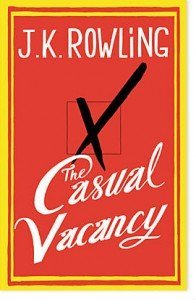 And as luck would have it for Hachette, that wiggle room includes the release of La Rowling?s eagerly awaited new aria.
And as luck would have it for Hachette, that wiggle room includes the release of La Rowling?s eagerly awaited new aria.
In the meantime, Hachette?s in a sweet spot where it?s no longer limited by Apple?s price bands, but non-Apple retailers like Amazon also aren?t allowed to discount its books. So if you want?The Casual Vacancy (now) you?ll be paying $17.99.
Owen includes the caveat that should Apple now be on a new contract with Hachette, it could discount ? and Amazon and other retailers might then be able to discount, as well.
But even more interesting, Owen includes a footnote to get at the usual emotionals around such issues as this:
J.K. Rowling?s new book on Kindle: Literally unreadable http://t.co/NcAFegqm (via @) wow how can they screw it up so badlyI?m aware this post is likely to engender a lot of ?greedy publishers? comments. The fact is that the ebook pricing settlement incentivizes publishers to set higher ebook list prices. Depending on the new contracts that Hachette works out with retailers, there may be little difference between the money that Hachette gets from?Casual Vacancy sales now and the money it gets once those new contracts are enacted.
?
And if you?re eager for early reviews, Theo Tait is out at the Guardian (which also has one of only two reviews Rowling did prior to the book?s release).
Tait does address the ?Harry Potter and the Miraculously Unguarded Vagina? joke. One probably has to. And then he goes on to deliver himself of an opinion you?ll have to read for yourself, I won?t tip it here, other than to note that he uses the odd phrase ?artificial contrivance.? I?m wondering how many times one encounters a natural contrivance.
Perhaps we?ll find out in Rowling?s book.
Click to comment
Back to Table of Contents
?
?
Two new partnerships announced last week suggest the emergence of new commercial models for publishing.

Mike Shatzkin
Mike Shatzkin, has a followup to comments he?s been making since 2007 about what he called then ?The End of General Trade Publishing Houses.?
He goes into his telling new essay, New publishing companies are starting that are much leaner than their established competitors, to size up the new Diller-Rudin Brightline announcement and the Movable Type Management initative, The Rogue Reader (currently in soft-launch beta), which we introduced last week in WRITING ON THE ETHER EXCLUSIVE: ?Rogue? Authors on a New Route.
The publishing ambitions here are quite different, but the point they make about the direction of publishing?s future are very much the same.
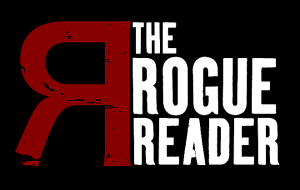 While pointing to the Diller-Rudin-Coady operation?s ability ?to compete with major publishers for major books,? he rightly contrasts The Rogue Reader project of Jason Ashlock and Adam Chromy for its entrepreneurial dexterity in ?a young and developing literary agency.?
While pointing to the Diller-Rudin-Coady operation?s ability ?to compete with major publishers for major books,? he rightly contrasts The Rogue Reader project of Jason Ashlock and Adam Chromy for its entrepreneurial dexterity in ?a young and developing literary agency.?
The message here is that we see a similar answer coming from the opposite ends of the continuum of investment and power of what the genesis of a successful future publisher might look like. Both an ambitious well-funded highly-commercial list headed by a publishing veteran and fledgling authors publishing in a niche under the direction of a young entrepreneur with much less seasoning are being launched on new publishing platforms which have copious capabilities to do digital publishing efficiently.
A clarification occurs in the comments under Shatzkin?s good piece ? there, Ashlock echoes the point he made in our piece, that the Rogue authors are self-publishing as part of a collective curated by Ashlock and Chromy.
But Shatzkin says very well where the trend can lead:
We are getting closer to the day when all a publisher really will need to ?own? is the ability to acquire and develop good books and ways to reach the core audience for them persuasively and inexpensively.
And the other side of that coin has to do with author-initiated versions of this kind of formulation. In time, more variants on these models may involve an authorial direction of? publishing functions hired as needed.
Even in terms of the place of print in the future, Shatzkin sees the same mechanism others are understanding:
These new publishers can treat the diminishing print-in-store marketplace as a bit of an afterthought because there are more and more sources from which to purchase those capabilities for as long as they are needed.
Click to comment
Back to Table of Contents
?
The AAP?s response to ALA?s open letter to publishers re: ebooks is fascinating for what it DOESN?T say.
That?s the Association of American Publishers and the American Libraries Association.
As usual, they?re not happy with each other. This time things are a bit more strident. And in Dear Libraries: No more free handouts for you freeloaders! Guy LeCharles Gonzalez ? former Ether sponsor and an employ with Media Source/Library Journals ? picks up on the latest exchange, taking issue with the implications he sees in the AAP?s widely decried letter.

Guy LeCharles Gonzalez
He cites this passage from the publishers? letter:
Publishers and local libraries have had a lifelong partnership dedicated to increasing literacy and nurturing the love of reading. The publisher members of AAP provide libraries with innumerable free resources, programs and services ? all designed to serve their cardholders, inform their librarians and sustain the vitality of their institutions.
And Gonzalez then follows up, emphasis his:
Critics hammer JK Rowling?s ?Casual Vacancy.? Will it earn back its (rumored $7 million) advance? http://t.co/YBlLJMsYBased on that, you?d think publishers view libraries as social marketing endeavors, making zero reference to the fact that libraries BUY BOOKS, and that a significant percentage of patrons who borrow also BUY BOOKS.
?
If you need to catch up on all this, Gary Price at InfoDocket can help you.
 Here is a part of Monday?s open letter from ALA chief Maureen Sullivan, in which she writes, emphasis hers:
Here is a part of Monday?s open letter from ALA chief Maureen Sullivan, in which she writes, emphasis hers:
If our libraries? digital bookshelves mirrored the New York Times fiction best-seller list, we would be missing half of our collection any given week due to these publishers? policies. The popular ?Bared to You? and ?The Glass Castle? are not available in libraries because libraries cannot purchase them at any price. Today?s teens also will not find the digital copy of Judy Blume?s seminal ?Forever,? nor today?s blockbuster ?Hunger Games? series.
Sullivan?s intent seems to be to push the long-running standoff between libraries and publishers on ebooks to something of a head:
We librarians cannot stand by and do nothing while some publishers deepen the digital divide. We cannot wait passively while some publishers deny access to our cultural record. We must speak out on behalf of today?s ? and tomorrow?s ? readers.The library community demands meaningful change and creative solutions that serve libraries and our readers who rightfully expect the same access to e-books as they have to printed books.
The publishers? side was, in a phrase, not amused, referring to Sullivan?s letter as ?a harshly critical open letter to the US publishing industry about e-lending.?
 The AAP, as trade organization representing some 300 publishers, writes back ? and note the reference at the end of this passage to a caution about ?antitrust restrictions?:
The AAP, as trade organization representing some 300 publishers, writes back ? and note the reference at the end of this passage to a caution about ?antitrust restrictions?:
Publishers support the concept of e-lending but must solve a breadth of complex technological, operational, financial and other challenges to make it a reality. Each publishing company is grappling individually with how to best serve the interests of its authors and readers, protect digital intellectual property rights and create this new business model that is fair to all stakeholders. And while the 9000-plus library systems? non-profit status permits them to convene, debate and reach consensus on these issues, commercial publishers cannot likewise come together due to antitrust restrictions.
And the publishers? side signs off with regret about the sentiments of the libraries? camp:
At a time when individual publishing houses are more actively engaged than ever in exploring viable solutions to e-lending, we are disappointed that the new leadership at ALA chose this path, with this particular timing, to criticize those efforts.
What may be in the offing here is an effort by the library community to take the ongoing crisis public ? or, at least, more public than has been done so far, in order to pressure more movement from the publishing contingent. It?s likely, after all, that libraries, rather than the publishers, will enjoy the favor of the public in almost any outcome.
Ugh. ?Limn,? along with the verb ?keen,? is one of the most annoying words ever: http://t.co/j5CfnWiw?
As we continue to watch things develop ? talks have been going on since last winter ? Andrew Albanese at Publishers Weekly in Macmillan Poised to Test Library E-book Model has this:
Macmillan officials have confirmed to PW that the publisher has developed a pilot project that would enable e-book lending for libraries?a potentially major development. However, details of the pilot remain undisclosed.
There?s hardly a sense of big smiles and high fives anywhere, though. Text from Macmillan, quoted by Albanese, reads:
We are currently finalizing the details of our pilot program and will be announcing it when we are ready, and not in reaction to a demand.
Good times.
Click to comment
Back to Table of Contents
?
?
I guess my primary criterion is ?engagement.? Am I engaged/captured/gripped by the words and deeds on the page, by the emotional reaction they create in me?

Ray Rhaymey
When Ray Rhaymey judges manuscripts for contests, he writes, he has a list of elements that go into that sense of engagement he?s looking for.
And in his post Here Comes the Judge for Writer Unboxed, he works up a three-point list of what goes into the engagement he looks for:
Story. Something is happening, a story is taking place. It?s in a place I can see, and there are people doing things.
A scene: That?s how a good writer shows what is happening, what I call an ?immediate? scene. It?s not a summary of information, it?s not exposition, it?s not what happened then, it is what is happening now.
Voice: I frequently read where agents name ?voice? as the number one thing that pulls them in. I can see that. Voice can translate into a personality of the story, and we all react to likeable personalities.
One reason I?ve included this post on the Ether this week is that I like how forthright Rhaymey is about the speed with which an experienced judge can recognize whether what?s needed is in place or not.
I spent a part of my career ? back in the 18th Century ? judging actors who were auditioning for university graduate programs in the theater arts. And what actors never liked hearing (understandably!) was that an experienced audition judge or casting director can tell within seconds whether someone is right for a role or a spot in an ensemble. Normally, by the time an actor has said her or his name and which monologue she or he is about to perform, you know. The ?acting? part is almost secondary.
?
Rhaymey is getting at a similar phenomenon here when he writes:
Many of us have faced the toughest judges in the business, literary agents. I think my take on what is good storytelling/writing comes close to theirs?I?ve judged over 600 opening chapters?and, let me tell you, your eye becomes quickly trained to see what works and what doesn?t work. Agents and editors will tell you that they can usually reach a yes/no decision on the first page. I believe them.
None of this should be taken by authors as depressing or hostile to their work and dreams and efforts. But it helps us all to face the fact that the kind of work we really want to do ? the stuff our own dreams are made on, to paraphrase a line I heard frequently in those stage auditions ? is work that arrives with its soul intact, its presence in place, its story, scene, and voice down pat.
And all this you hear about ?good writing? being the key? Here?s Rhaymey again:
The main criterion isn?t, really, good writing. That?s the price of entry, the foundation upon which a good story can be built. You don?t get any credit for good language/grammar/etc. from me or an agent or an editor. It makes a ?yes? decision possible, but that?s all.
Click to comment
Back to Table of Contents
?
Sometimes we lose perspective with our stories.? The plot and the characters become wallpaper to us.? We know we need an extra set of eyes to find the problems with our book?the plot holes, the echoes of repeated words, the loose ends we forget to tie up.

Elizabeth Spann Craig
Elizabeth Spann Craig?s output? in cozy and traditional mysteries is admired by many of her blog readers. It?s likely that many people think Craig is always entertained by and engaged with her characters and stories.
On the contrary, in Discovering What Delights, Craig tells of how a neighbor child?s thrill over seeing hummingbirds ? at a backyard feeder that, for Craig, becomes ?wallpaper to us? ? reminded her how remarkable the birds are.
And because writing, editing, revising can become so grueling, of course, one?s story and characters and settings can become that backyard wallpaper to a writer.Craig has the answer:
It?s just as important to have that extra set of eyes to find what?s right with our story?what?s special.? A turn of phrase, a genuine character, a well-drawn villain. The hours of editing can make us lose perspective on the good parts, too.? We need to know what works so that we can provide more of it.
Click to comment
Back to Table of Contents
?
In Book Publisher Goes To Court To Recoup Hefty Advances From Prominent Writers, the Smoking Gun reports:
The Penguin Group?s New York State Supreme Court breach of contract/unjust enrichment complaints include copies of book contracts signed by the respective defendants.
Authors involved in the court action, according to the report, include Elizabeth Wurtzel, Ana Marie Cox, and Holocaust survivor Herman Rosenblat (whose story of concentration-camp love turned out to be false).
Some large advance figures are involved, and commenters include Don Wiggins, who writes:
I believe I?ll write a book about the disintegration of traditional publishing methods. Just send me the 30K advance and I?ll get right on it.
Click to comment
Back to Table of Contents
?
Friday and Saturday, Jane Friedman, digital editor with VQR, long-suffering host of the Ether, and hashtag unto her verified self, will be engaging with colleagues in Berlin at the LitFlow conference.
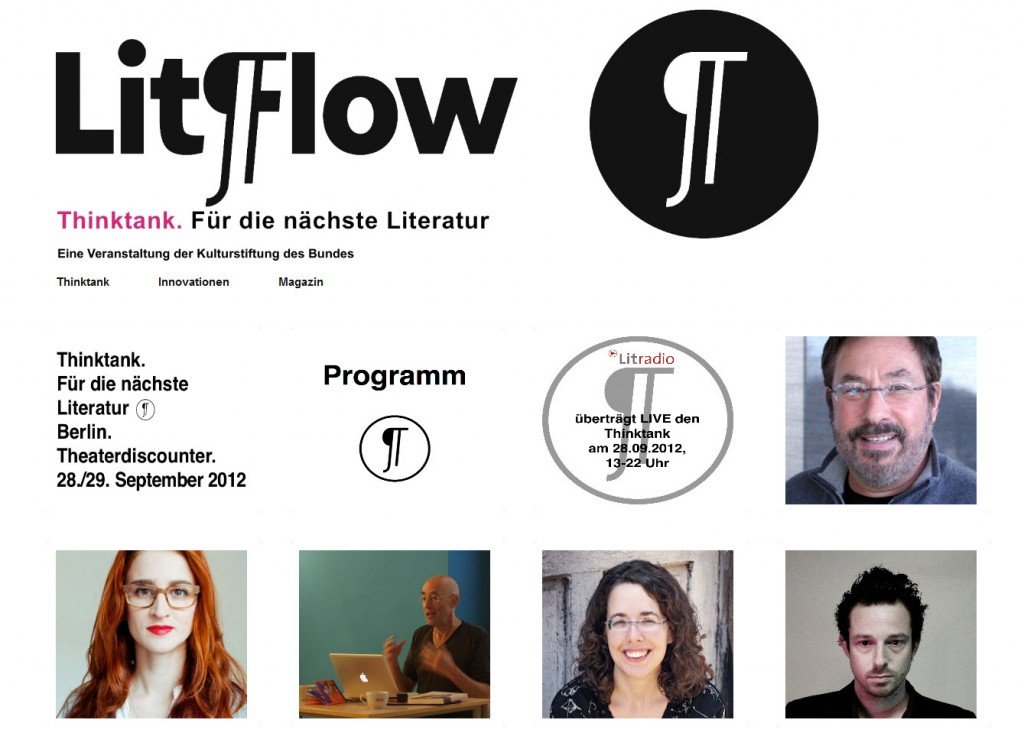 The sessions are conducted in think-tank format, as a kind of big-table debate, which is an exciting and highly immersive format ? I wish we saw it more frequently in the States.
The sessions are conducted in think-tank format, as a kind of big-table debate, which is an exciting and highly immersive format ? I wish we saw it more frequently in the States.
Here?s the LitFlow site, and Jane will be tweeting from time to time as the sessions go forward, keep an eye out.
And for an updated list of planned confabs, please see the Publishing Conferences page at PorterAnderson.com.
Frankfurt-bound folks may want to give special consideration to the Tools of Change (TOC) Metadata Goes Global program with Brian O?Leary and Laura Dawson, and a very promising-sounding Publishers Launch event from Mike Shatzkin and Michael Cader.
Ed Nawotka has announced that his Publishing Perspectives will host a free two-hour session in in Frankfurt on the morning of October 13, an ?ignite?-style round of presentations on the subject of self-publishing. You?re asked to RSVP to warmuth@book-fair.com
Click to comment
Back to Table of Contents
?
The books you see here have been referenced recently in Writing on the Ether.
I?m bringing them together in one spot each week, to help you recall and locate them, not as an endorsement. And, needless to say, we lead our list weekly with our fine Writing on the Ether Sponsors, in gratitude for their support.
?
Writing on the Ether Sponsors:
?
Click to comment
Back to Table of Contents
?
?
A multidisciplinary team led by University of Cincinnati researchers came out Sept. 26 with a paper that aims to help biologists who work with color-changing creatures and engineers who work with e-Paper technology.
Even as the news of Barnes and Noble?s new HD Nooks breaks ? here is Steve Kovachat Business Insider with the (perhaps overstated)? Amazon?s Kindle Fire Just Became A Dud ? this quaint report from ScienceDaily about scientists looking to enhance their concepts of eInk through studies of color-changing sea creatures.
The original story is credited to M.B. Reilly and this write is put together with materials from the University of Cincinnati.
One of the researchers? key findings is that there are numerous approaches to change the reflective color of a surface and that the highest-performance approaches developed by both humans and nature share some powerful common features. Both use pigment, and both change or achieve color expression by either spreading or compacting that pigment. Animals use muscle fiber to spread or compact pigment, and electronics make use of an electric field to do so.
Not surprisingly, we?re being passed like we?re standing still by color-flipping cephalopods.
Overall, animals ?outscore? synthetic devices when it comes to sophistication and integrated systems; required energy use for color change; size scalability (cephalopods? adaptive coloration works over a wide range of sizes in the organisms? class ? from small-size cuttlefish to large-size octopus and squid); and surface texture (cephalopods can selectively adapt or ?crinkle? their skins to match a variety of three-dimensional textures, which provides additional light scattering and shadowing).
Where do we have an advantage? Speed. Our color changes are faster than their color changes. In historical terms, though, we?ve been dragging our pods. As a researcher puts it:
?The highest performance human-made approaches have been only recently developed, well after numerous other approaches were tried. Perhaps in the past, if we had more closely trusted nature?s ability to find the best solution, we would be further along today in creating better display technology.?
Click to comment
Back to Table of Contents
?
Main Image: iStockphoto: Nikada
indianapolis colts joseph kony joseph kony ipad 3 release date apple store down apple live blog ohio primary
No comments:
Post a Comment
Note: Only a member of this blog may post a comment.